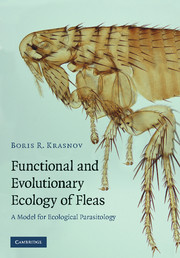Book contents
- Frontmatter
- Contents
- Preface
- Part I Brief descriptive ecology: what do fleas do?
- Part II Functional ecology: how do fleas do what they do?
- 7 Ecology of sexual dimorphism, gender differences and sex ratio
- 8 Ecology of flea locomotion
- 9 Ecology of host selection
- 10 Ecology of haematophagy
- 11 Ecology of reproduction and pre-imaginal development
- 12 Ecology of flea virulence
- 13 Ecology of host defence
- Part III Evolutionary ecology: why do fleas do what they do?
- References
- Index
13 - Ecology of host defence
Published online by Cambridge University Press: 14 August 2009
- Frontmatter
- Contents
- Preface
- Part I Brief descriptive ecology: what do fleas do?
- Part II Functional ecology: how do fleas do what they do?
- 7 Ecology of sexual dimorphism, gender differences and sex ratio
- 8 Ecology of flea locomotion
- 9 Ecology of host selection
- 10 Ecology of haematophagy
- 11 Ecology of reproduction and pre-imaginal development
- 12 Ecology of flea virulence
- 13 Ecology of host defence
- Part III Evolutionary ecology: why do fleas do what they do?
- References
- Index
Summary
A host is not a passive victim of a parasite but rather defends itself actively against the detrimental effects of parasitism. I have already mentioned two strategies of defence that can be implemented by a host: (a) it may attempt to avoid the parasite by choosing an appropriate habitat or patch; and (b) it may attempt to kill the parasite (Combes, 2001, 2005). The first strategy is purely behavioural, whereas the second strategy comprises behavioural, physiological and immunological defence tools. Moreover, anti-parasitic behaviour may include attempts to kill the parasite not only by using the host's own instruments such as beaks, teeth and claws but also by using extrinsic materials such as plants with insecticide or repellent properties. In other words, these are two lines of defence against parasites suggested by Combes (2001, 2005). In case of fleas, I advocate modifying this scheme and distinguishing three lines of defence. The first line is to avoid an encounter with fleas (implementing appropriate behaviour), the second line is to get rid of fleas by repelling or killing them (again, implementing appropriate behaviour), whereas the third line is to minimize the harm done by fleas (implementing the immune system). The boundary between the second and the third line is thus instrumental (what is the tool that a host uses) rather than ideological (what is the aim that a host attempts to achieve).
- Type
- Chapter
- Information
- Functional and Evolutionary Ecology of FleasA Model for Ecological Parasitology, pp. 239 - 280Publisher: Cambridge University PressPrint publication year: 2008



